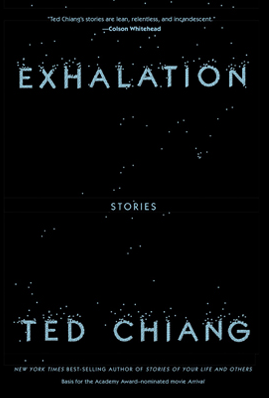
One of the best experiences, as a reader, is when you discover a new writer with whom you feel a connection. Not necessarily a debut author, but new in the sense that you’ve never previously read anything by him or her. My latest such discovery is Ted Chiang. Science fiction readers are, undoubtedly, well-acquainted with Chiang. Over the last two decades, his stories have won numerous Hugo and Nebula science fiction awards, and his novella “Story of Your Life” was turned into the Academy Award-nominated movie Arrival. But for this infrequent science fiction reader, Exhalation: Stories was my introduction to Ted Chiang’s work.
 Exhalation is a collection of nine short stories and novellas, some of which have been published before in science fiction anthologies or magazines, and others whose inclusion in this book mark their debut. Although the tales fall firmly in the camp of science fiction, taking place in speculative, alternate, or futuristic realities, the philosophical questions that his stories provoke – about the nature of time, memory, digital responsibility, fate, and free will – are what I found most interesting and, I think, give Chiang’s work a broader appeal beyond just fans of science fiction.
Exhalation is a collection of nine short stories and novellas, some of which have been published before in science fiction anthologies or magazines, and others whose inclusion in this book mark their debut. Although the tales fall firmly in the camp of science fiction, taking place in speculative, alternate, or futuristic realities, the philosophical questions that his stories provoke – about the nature of time, memory, digital responsibility, fate, and free will – are what I found most interesting and, I think, give Chiang’s work a broader appeal beyond just fans of science fiction.
Here are a few of my favorite stories from the collection:
The Merchant and the Alchemist’s Gate
Like a tale out of Arabian Nights, this narrator takes us on a mind-bending adventure through time in ancient Baghdad. Unlike Robert Zemeckis’ world in the movie Back to the Future, in Ted Chiang’s vision, journeying to the past cannot change what happens in the future. Despite being unable to rectify a tragedy that occurred in his past, the narrator’s time travels afford him with a deeper understanding of, and appreciation for, life.
Exhalation
The world in this story is populated with a race of mechanical beings, who, like humans, think, breathe, and live, but whose bodies are made of metal and machinery. Despite their differences from the human race, the questions that they wrestle with – the quest for knowledge and search for answers to life’s origins and meaning – are instantly recognizable. During his pursuit to understand how memories are engraved and stored in the brain, the narrator discovers that their world’s ability to support life is finite. Eventually, air pressure will reach an equilibrium and result in the end of all life on his world. While reading this story, I couldn’t help but make the comparison to earth’s limited natural resources and the effects of their depletion on our environment. This allegory struck me as especially relevant because of the current hot-button issue of climate change, as well as prescient given that the story was originally published eleven years ago when the topic was just a blip on most people’s radar.
The Truth of Fact, the Truth of Feeling
Subjectivity, memory, and truth are explored through two lenses in this tale. One narrative takes place in a future where people keep lifelogs that record every minute of their lives. The development of new software called Remem allows people to easily search and replay their lifelogs and is marketed by the developer as a replacement for people’s natural memory. The second takes place in west Africa and follows a young man named Jijingi who is taught to write by a European missionary. He is the first in his village to learn writing. Prior to his education, all of the tribe’s history was passed down orally by storytellers. In both story lines, the narrator and Jijingi learn that past events and memories do not always align. Does an event as it actually occurred offer a greater truth or carry more import than our memories of that event? How should those differences be reconciled?
The breadth of Ted Chiang’s imagination is staggering. Not only that, but the man can write. Although he creates realities that are difficult to imagine, the questions that his characters face in each story are imbued with recognizable humanity. Ted Chiang acknowledges man’s flaws and the problems we create for ourselves with our hubris, and yet I felt his book carried a thread of hope throughout and an overall optimism for life.
As readers, we all have our favorite genres that we turn to time and again, but this book was a good reminder to, on occasion, read outside my comfort zone. I highly recommend this collection of short stories to anyone looking to do the same.
Discover more from Cook Memorial Public Library District
Subscribe to get the latest posts sent to your email.
Categories: Books and More
Tags: Books and More
